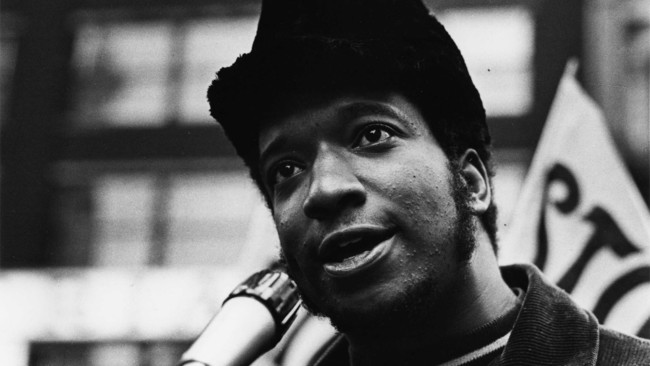Goings On: Restorations, Representation, and More

New York. Tomorrow through Wednesday, the Metrograph presents new 35 mm prints of ten features and five shorts as the UCLA Festival of Preservation flies in from the left coast. In the Village Voice,Melissa Anderson previews Howard Alk’s “scalding documentary” The Murder of Fred Hampton (1971, image above); Fernando Ayala’s Los Tallos Amargos (The Bitter Stems, 1956), a “noir from Argentina . . . drenched in REM-sleep dread”; Martin Gabel’s The Lost Moment (1947), a “fruity adaptation of Henry James’s The Aspern Papers”; and “two features written and directed in the mid-Sixties by Juleen Compton”: Stranded (1965) “runs aground with its surfeit of whimsy. . . . Much better—and stranger—is The Plastic Dome of Norma Jean (1966), whose title character is a clairvoyant Ozark teen played by Sharon Henesy.”
With this piece, by the way, Melissa Anderson bids farewell to the Village Voice. We can now look forward to her contributions to 4Columns, a relatively new but already outstanding publication.
“Spare and heartsick, Arturo Ripstein’s 1966 cycles-of-violence western parable Time to Die finds nothing romantic in showdowns and shootouts,” writes Voice film editor Alan Scherstuhl. “It’s a swift slow burn of a film, the story of a man who once got pushed too far with terrible results now getting pushed too far again, with results that are, as the title suggests, sure to be worse. The screenplay may come from novelists—it’s credited to no less than Gabriel Garcia Marquez and Carlos Fuentes—but don’t look to it for novelistic expansiveness. Ripstein’s debut is pared down, whetted to a cutting sharpness.” The week-long run at Film Forum starts tomorrow.
“Nitehawk Cinema is presenting two new comedies this week,” writes Kristen Yoonsoo Kim in the Voice, “one about a suspected serial killer, the other about the Holocaust. But taboo isn’t the running theme of ‘Representation,’ the theater’s mini-program (though there’s a lot of that); its purpose is to highlight up-and-coming female filmmakers in independent cinema. Nitehawk plans to make this an ongoing series, aiming for at least one screening a month, and to expand it to their second location, in Park Slope, when it opens in early 2018.” Ingrid Jungermann’s Women Who Kill screens Saturday and Sunday; Ferne Pearlstein’s The Last Laugh on Monday and September 23 and 24; and Jennifer Reeder’s Signature Move is slated for September 30 and October 1.
“Anthology Film Archives hosts East Village animator par excellence M. Henry Jones as part of their ongoing Re-Visions: American Experimental Film 1975-90 series,” writes Danielle Burgos at Screen Slate. “AFA created Re-Visions to call attention to current experimental works outside the canon they inadvertently created with their Essential Cinema series—this outing centers on Jones’s groundbreaking cutout animation set to the Fleshtones’ ‘Soul City.’” Tonight.
On Saturday, Screen Slate celebrates the releases of Screen Slate: New York City Cinema 2011-2015 and a jackass reader with a Back-to-School Bash at Light Industry.
Crispin Hellion Glover will be at the Alamo Drafthouse in Brooklyn on Tuesday and Wednesday to present It is fine. EVERYTHING IS FINE! (2007) and What Is It? (2005), and Filmwax Radio host Adam Schartoff talks with him about both films and more (83’44”).
Los Angeles. “Robert Altman has been chosen for the American Film Institute’s inaugural retrospective spotlighting a filmmaker of global significance,” reports Greg Evans for Deadline. “The retrospective, including screenings and discussions, will run during this year’s AFI Fest November 9-16 in Hollywood. It’s billed as the first of an annual event.”
“Director Alejandro González Iñárritu’s virtual-reality gesamtkunstwerk, Carne y Arena (Virtually Present, Physically Invisible), is an ultra-immersive triptych that aims to give visitors the opportunity to briefly experience the treacherous journey of crossing the Mexico–United States border,” writes Olivia Gauthier for Hyperallergic. Currently, Carne can be experienced at LACMA.
Chicago. “Anyone who cares about the evolution of cinema should rush to see Bertrand Bonello’s Nocturama, which is screening all week at Facets,” declares Ben Sachs in the Reader. Tonight is, in fact, the last night to catch it.
And from Newcity’s Ray Pride: “Dawson City: Frozen Time, the latest, extraordinary film by Bill Morrison, washes over the brain like cool, cool history: an intricate singularity and a cinematic gold rush that I could gush about for hours but would rather point emphatically in its direction.” Tomorrow, Saturday, Tuesday, and Wednesday.
Austin. “If you think French cinema begins with Truffaut and ends with Godard, Ciné-Club founder Julia Podgorsek McMahan has a new wave of satires, comedies, and working-class dramas for you,” writes the Chronicle’s Richard Whittaker. “This month's film, 2016 comedy La Loi de la Jungle, is a perfect example, being both a jab at France's colonial history and a commentary on modern employment practices.” Antonin Peretjatko’s film screens Sunday.
Paris. Today through October 21, Marian Goodman Gallery presents Chantal Akerman Now, an exhibition devoted to two video installations.
Saturday is the Nuit Planète des singes at the Cinémathèque française.
Berlin. Today through Tuesday, the Zeughauskino presents a retrospective of films by a group of cinephiles associated in one way or another with the Filmclub 813 in Cologne: the Kölner Gruppe.
For news and items of interest throughout the day, every day, follow @CriterionDaily.



